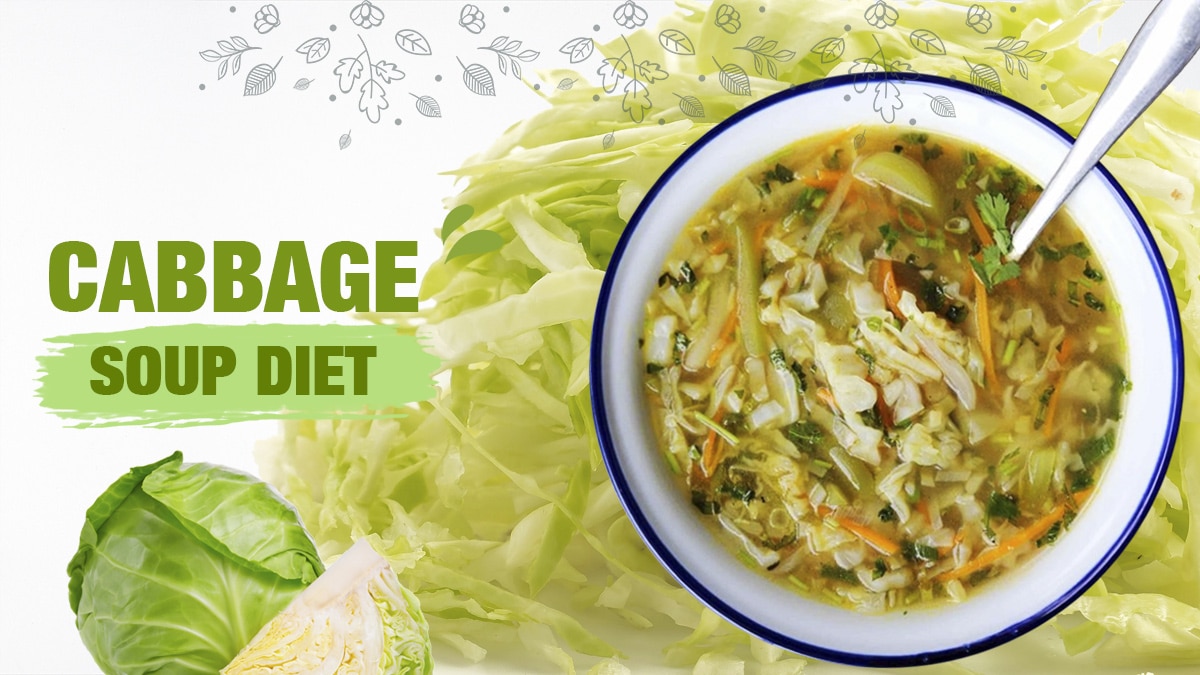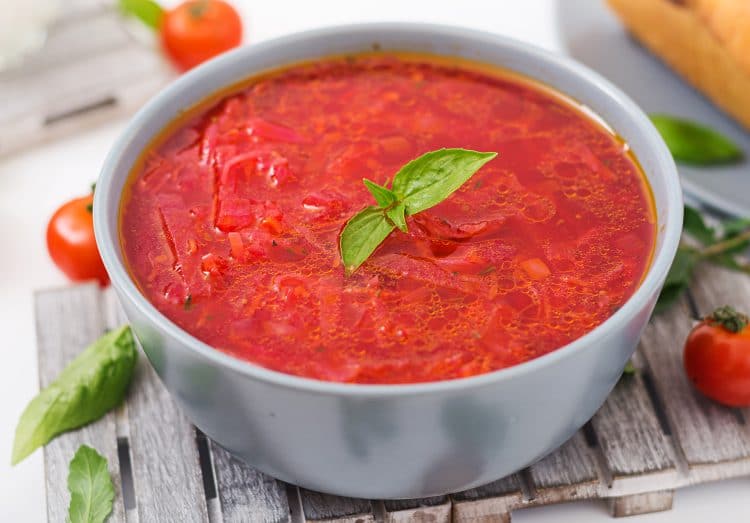About The Cabbage Soup Diet
The cabbage soup diet is a rapid weight loss diet. Many people have claimed that following the cabbage soup diet helped them lose at least ten pounds in seven days [1]. The majority of the diet consists of eating cabbage soup, as implied by the name. But, other foods are allowed on specific days of the diet, mostly low-fat and high-fiber foods such as lean meats, brown rice fruits, and vegetables [2].
While there are specific rules on what foods can be eaten on each day of the week, you are allowed to eat an unlimited amount of those foods. Overall, even though the cabbage soup diet is not restrictive in the amount of food you can eat, it is very restrictive in the type of foods you can eat.
While we do not know for sure when or where the cabbage soup diet originated, we know that it has been around since the 1950s [2]. There are rumors that the cabbage soup diet was invented by the Sacred Heart Hospital to help obese patients lose weight in preparation for heart surgery [2]. But, they deny this claim, and it is not supported by evidence [2]. It wasn’t until the 1980s that the cabbage soup diet became popular for rapid weight loss [2]. It is still a very popular diet today that is marketed as a rapid weight loss diet [12]. Many people gravitate towards following this diet when they are looking to lose weight quickly to prepare for a special event or vacation [12].
Homemade Cabbage Soup Recipe
While there are many variations of cabbage soup, here is a basic cabbage soup recipe that follows the guidelines of the cabbage soup diet [1,2].
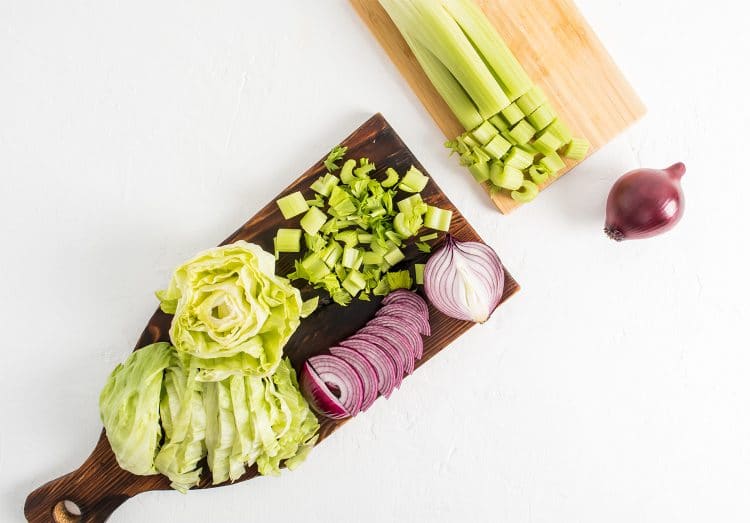
Ingredients
- 1 head of cabbage
- 2 large onions
- 2 green peppers
- 1 bunch of celery
- 4 large carrots
- 2 cans of chopped tomatoes
- 2 cans of green beans
- 1 package (250g) of sliced mushrooms
- 1-2 bouillon cubes
- 6-8 cups of water
- Salt and pepper
- Spices of choice (herbs, spice powders, or hot sauce)
Directions
- Cut and chop all of the vegetables into cubes or small pieces.
- In a large stockpot, sauté the chopped onions in a small amount of oil until tender.
- Add all of the cut-up vegetables into the stockpot with the onion, then cover with water.
- Add the bouillon cubes, salt and pepper to taste, and any other spices of choice into the pot.
- Bring to a boil and boil for 10 minutes. Then, reduce heat to low and simmer for about 30 minutes until the vegetables are tender. Make sure to not boil for much longer, or the vegetables will become mushy.
Notes:
- You can store the cabbage soup in an air-tight container for up to 4 days in the refrigerator. It can also be frozen for up to 2 months.
- Some recipes suggest freezing single portions of the soup so that it can easily be defrosted to consume.
- Other non-starchy vegetables can be added to the soup, such as spinach or kale.
- You can double the batch to ensure that there will be enough soup to last the full duration of the diet. You could keep half of the soup in the fridge then freeze the rest until you need it.
- You could use low-fat beef broth or V8 juice in place of the bouillon cubes and water.
What to Eat Each Day on the Cabbage Soup Diet
The meal plan for the cabbage soup diet has strict guidelines on what foods you can eat. But the good news is that you can eat an unlimited amount of those specific foods. The main food that you are allowed to eat is cabbage soup. Cabbage soup is very low in calories, and you may eat as much as you need to avoid feeling extremely hungry [11].
Most people eat two to three bowls each day between lunch and dinner, but you can eat more. There are a few other foods that are allowed on different days of the diet, such as fruits, vegetables, rice, and lean protein.
Here are the standard guidelines to follow for the cabbage soup diet. [1, 2].
Guidelines
Day 1:
- Unlimited cabbage soup
- Any fruit except bananas. Pick fruits that are low in sugar, such as apples, and low-calorie fruits, such as watermelon.
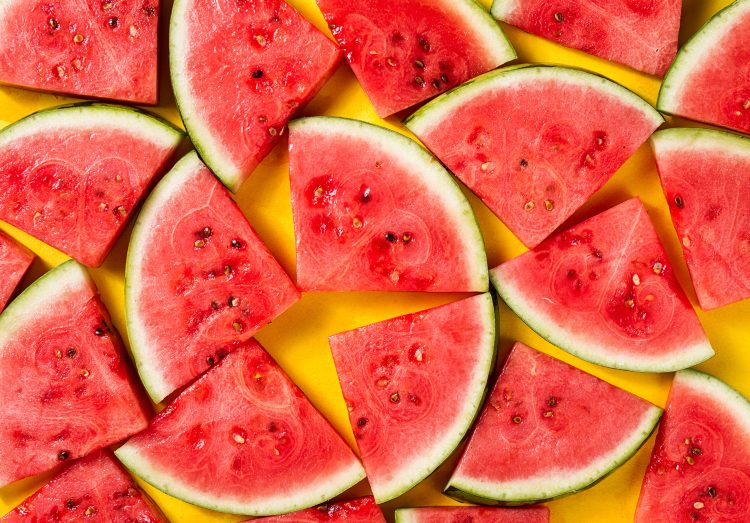
Day 2:
- Unlimited cabbage soup
- One baked potato. It may be prepared with a small amount of butter or oil.
- Unlimited non-starchy leafy greens. For example, spinach, kale, or collard greens. They may be eaten raw or cooked.
- No fruit, corn, peas, or beans
Day 3:
- Unlimited cabbage soup
- Unlimited fruits except for bananas
- Unlimited vegetables except for potatoes
Day 4:
- Unlimited cabbage soup
- Unlimited bananas
- Unlimited skim milk
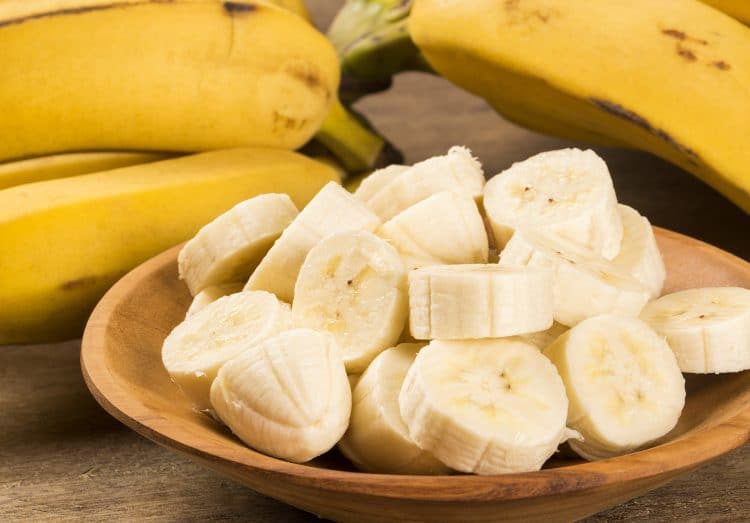
Day 5:
- Unlimited cabbage soup
- 10 to 20 ounces of lean beef (chicken or fish is allowed as a substitute)
- Up to 6 fresh tomatoes
- Drink at least 6-8 glasses of water on this day
Day 6:
- Unlimited cabbage soup
- Unlimited vegetables (focus on leafy greens)
- Lean beef or chicken every meal (fish is allowed unless it was consumed the previous day)
Day 7:
- Unlimited cabbage soup
- Unlimited non-starchy vegetables (no potatoes, corn, or peas)
- Unlimited unsweetened fruit juice
- Brown rice allowed
The beverage guidelines to follow while on the cabbage soup diet are also strict. It is highly encouraged that you drink at least 6-8 glasses of water every day. Unsweetened calorie-free beverages are also allowed, such as coffee or tea [2].
Weight Loss
While people claim that the cabbage soup diet causes them to lose 10 pounds in one week, there is no scientific evidence to support these claims [11]. The cabbage soup diet has never been studied in a trial to determine if it is effective for weight loss [1]. There is also no scientific evidence to show that the cabbage soup diet is safe, suitable, or healthy for weight loss [11].
There is no magic behind the cabbage soup diet that causes people to lose weight, and cabbage soup itself is not a magical soup with weight loss properties. The main reason that people lose weight when following the cabbage soup diet is because it is a low-calorie or calorie-restrictive diet [1, 12].
The cabbage soup diet is classified as a low-calorie diet because you do not consume more than 800-1,200 kcal each day [10]. Due to limited amounts of carbohydrates, fats, and proteins consumed in the cabbage soup diet, it would be very hard to eat more than 1,200 calories each day, even if you eat as much cabbage soup as you want.
On days 1 through 3 of the cabbage soup diet, you eat less than 1,000 calories per day, and on days 4 through 7, you eat about 1,000 to 1,200 calories per day [11]. This is much lower than the number of calories recommended for healthy weight loss. On average, a healthy caloric deficit would be 500 calories less than your daily calorie needs [17]. You can use a calorie deficit calculator to calculate the number of calories that you need to restrict in order to lose weight in a healthy way.
The calorie restriction that occurs when following the cabbage soup diet causes a negative energy balance [8]. Meaning that your body is using more calories than you are consuming. There are two phases of weight loss through calorie restriction. In the first phase, weight loss is rapid in the first four to five days [8]. The weight loss experienced during this phase is not due to losing fat mass [8]. It is a result of losing extracellular and intracellular water [8]. You do not begin to lose fat mass until the second phase of weight loss from calorie restriction, which is a much slower weight loss process [8].
As far as we know, only about 34% of weight lost during the one-week cabbage soup diet is body fat loss [11]. The majority is water loss and muscle tissue loss [11]. The first thing that your body does when it does not receive enough calories is that it breaks down muscle mass for energy [11]. Breaking down muscle mass, however, can slow down your metabolism [11]. This means that you will burn fewer calories during the days you are doing the cabbage soup diet. Calorie restriction, in general, can also cause your metabolic rate to decrease [1].
The initial weight loss experienced by people who complete the cabbage soup diet can also be related to a drop in insulin, which can cause the kidneys to retain more sodium, leading to extra sodium and potassium loss in urine [10]. The high amount of fiber consumed in the cabbage soup diet can also lead to going to the bathroom more [12]. Both of these functions lead to weight loss due to extra water loss.
Other Benefits
While weight loss may be one of the main benefits of following the cabbage soup diet, there may be a few other benefits.
First of all, the cabbage soup diet is a simple diet that is very easy to follow [4]. It is also very affordable since you do not need to purchase expensive foods, supplements, or diet plan books [1].
Another benefit is that you are allowed to eat as much cabbage soup as you want and unlimited amounts of specific foods on certain days [1]. You are not forced to be hungry when following the cabbage soup diet, and it may actually be filling [4].
Since you are allowed to eat a lot of fruits and vegetables, the diet is high in fiber. Eating a high amount of fiber can be beneficial in helping control your blood sugar levels, lower cholesterol levels, and even help you achieve healthy weight loss as you stay satisfied longer [16].
Lastly, cabbage is considered to be an anti-inflammatory food [12]. Anti-inflammatory foods can help regulate your blood sugar levels and your metabolism [12]. Scientifically, obesity has been categorized as low-grade chronic inflammation, and some studies show that the anti-inflammatory properties in cabbage may help those with obesity lose weight if they are following a long-term healthy diet and exercise plan [13].
Potential Risks
The cabbage soup diet is classified as a rapid weight loss diet because you lose more than 2 pounds in a week [7]. According to the CDCs health weight loss guidelines, healthy weight loss is losing only 1 to 2 pounds per week [6]. Due to this, it is not recommended to continue the cabbage soup diet for more than one week [12]. There are many potential risks associated with following the cabbage soup diet, even if it is just for one week. If anyone wants to repeat the diet to lose more weight, it is recommended to take a two-week break before following the cabbage soup diet again [1].
The cabbage soup diet is extremely calorie-restrictive. Women should not consume less than 1,200 calories a day, and men should never consume less than 1,500 calories a day because eating fewer calories would cause your body to be deprived of the nutrients needed to maintain basal metabolic rate [13, 15].
Macronutrient and micronutrient deficiencies have associated risks and consequences that can occur [14]. In general, they can cause you to your feel exhausted, feel ill, and reduce your cognitive function [14]. Specifically, the lack of protein in the cabbage soup diet can cause a deficiency in many vitamins and minerals [1]. The lack of protein in the diet can also lead to muscle loss [1].
The lack of micronutrients consumed could also cause specific adverse risks. A limited consumption of iodine could cause goiter and hypothyroidism [14]. A magnesium deficiency could cause neurological, gastrointestinal, and cardiovascular disorders [14]. A lack of zinc could suppress immune function [14]. A manganese deficiency could cause neurodegeneration. Also, diets with limited amounts of copper consumption could cause anemia and fertility issues [14].
While most of these issues develop when the body is deprived of nutrients for an extended period of time, any diet that is deficient in nutrients should be entered into with caution. It is highly recommended to take a multivitamin when following the cabbage soup diet in order to reduce the risk of nutrient deficiency [1].
The majority of the weight loss that occurs when following the cabbage soup diet is from losing water. The human body stores glycogen as an energy reserve and glycogen is bound to water molecules [1]. When you follow a low-calorie diet, such as the cabbage soup diet, your body uses the stored glycogen as energy to make up for the lack of calories consumed [1]. This is what causes the water loss. Since excess water is lost, it would be important to drink at least 8 glasses of water each day while following the diet to prevent the side effects of mass water loss such as constipation, dizziness, and dry skin [10].
While the cabbage soup diet may be effective for rapid weight loss, rapid weight loss may result in gallstones, gout, constipation, diarrhea, nausea, and fatigue [7].
The lack of fat consumed in the cabbage soup diet could also be hazardous. Diets that are very low in fat could potentially wreck your metabolism, causing you to gain the weight back, plus more, after your stop the diet [12]. The low amount of fat consumed in rapid weight-loss diets is often the cause of developing gallstones [1]. The gallbladder releases digestive liquids to help break down fats that you eat [1]. If the gallbladder does not empty due to not needing to release digestive liquids, gallstones can form [1].Gallstones are extremely painful and can result in necessary surgery to have the gallbladder removed.
In addition, having a negative energy balance can lead to many uncomfortable issues such as constipation, stomach cramps, headaches, dry mouth, dizziness, difficulty concentrating, fatigue, loss of consciousness, dry skin, hair loss, muscle loss, and even menstrual irregularities in women [10, 11].
Low carb diets can also cause insulin levels and blood sugar levels to drop, which could be very dangerous for diabetics [1, 11].
Overall, following the cabbage soup diet is stressful on your body and can result in many possible risks. The possible risks of the cabbage soup diet may outweigh the weight loss benefits. It is highly recommended that the cabbage soup diet should not be followed for longer than a week [1].
Frequently Asked Questions
Can you lose weight by just eating cabbage soup?
You could lose weight by just eating cabbage soup since it is very low in calories. However, it is the daily caloric deficit that would cause you to lose weight, not the cabbage soup itself.
What do you eat on the cabbage soup diet?
When you follow the cabbage soup diet, you mainly eat cabbage soup. Other foods are allowed on specific days of the diet, such as lean protein, fruits, vegetables, and skim milk.
Does the cabbage soup diet burn belly fat?
No, the cabbage soup diet does not burn belly fat. The weight loss experienced when following the cabbage soup diet is mostly due to water and muscle loss.
What are the side effects of the cabbage soup diet?
There are many side effects of the cabbage soup diet since it is a very low calorie diet and does not provide enough micronutrients. The most common possible side effects include exhaustion, feeling ill, fatigue, constipation, dizziness, and headaches.
Wrapping Up
The cabbage soup diet can be an effective diet for weight loss due to the fact that it is a low-calorie and restrictive diet. The caloric deficit is the cause of weight loss. There is no scientific evidence that shows that the cabbage soup diet is effective for fat loss [4]. The majority of weight loss in this one-week diet plan is water weight and muscle mass.
While the cabbage soup diet may appear to be effective for weight loss, following the diet does not lead to healthy weight loss, and many potential health risks can occur.
Overall, the cabbage soup diet is not a long-term weight loss solution, and unfortunately, rapid weight loss diets tend to lead to gaining the weight back quickly after the diet has ended [7]. Successful weight loss requires long-term changes, including eating a healthy and balanced diet and engaging in physical activity [5]. If you are looking to find a diet plan, look for a diet plan that does not restrict foods, includes a variety of healthy foods that you enjoy eating, and incorporates physical activity [3]. Remember, healthy weight loss is losing 1 to 2 pounds per week [6].
If you are interested in trying the cabbage soup diet (or any other diet plan), make sure that you talk to your doctor before you start. Some diets can be risky when you are on certain medications or have existing medical issues [3].
References:
- Jones, T., RD. (2018, December 12). The Cabbage Soup Diet: Does It Work for Weight Loss? https://www.healthline.com/nutrition/the-cabbage-soup-diet#what-it-is
- Cabbage soup diet, Wikipedia, 8 June 2021, retrieved 21 March 2022
- Mayo Clinic Staff. (2020, June 6). Weight loss: Choosing a diet that’s right for you. Mayo Clinic. https://www.mayoclinic.org
- Zhu, Yong; Hollis, James H. (28 April 2014). “Soup consumption is associated with a lower dietary energy density and a better diet quality in US adults“. The British Journal of Nutrition. 111 (8): 1474–1480.
- Centers for Disease Control and Prevention. (2021, September 13). Healthy Weight. https://www.cdc.gov/healthyweight/index.html
- Centers for Disease Control and Prevention. (2022, January 24). Healthy Weight Loss. https://www.cdc.gov/healthyweight/losing_weight/index.html
- Medline Plus. (2020, May 13). Diet for rapid weight loss. https://medlineplus.gov/ency/patientinstructions/000885.htm
- Müller, M. J., Enderle, J., & Bosy-Westphal, A. (2016). Changes in Energy Expenditure with Weight Gain and Weight Loss in Humans. Current Obesity Reports, 5(4), 413–423. https://doi.org/10.1007/s13679-016-0237-4
- Gilden Tsai, A., & Wadden, T. A. (2006). The Evolution of Very-Low-Calorie Diets: An Update and Meta-analysis*. Obesity, 14(8), 1283–1293. https://doi.org/10.1038/oby.2006.146
- Saris, W. H. (2001). Very-Low-Calorie Diets and Sustained Weight Loss. Obesity Research, 9(S11), 295S-301S. https://doi.org/10.1038/oby.2001.134
- Huizen, J. (2021, February 27). What is the cabbage soup diet, and how does it work? Medical News Today. https://www.medicalnewstoday.com/articles/cabbage-soup-diet#how-it-works
- Cherney, K., PhD, & Grieger, L. R. (2020, January 16). Cabbage Soup Diet Review: What’s in It and What Experts Say. EverydayHealth.Com. https://www.everydayhealth.com/diet-nutrition/cabbage-soup-diet.aspx
- Navaro, D. A., Raz, O., Gabriel, S., Shriqui, V. K., Gonen, E., & Boaz, M. (2017). Functional Foods in fad diets: A review. Functional Foods in Health and Disease, 7(9), 702–715. https://doi.org/10.31989/ffhd.v7i9.346
- Braga, D., Coletro, H., & Freitas, M. (2019). Nutritional composition of fad diets published on websites and blogs. Revista de Nutrição, 32. https://doi.org/10.1590/1678-9865201932e170190
- Harvard Health. (2020, July 11). Calorie counting made easy. https://www.health.harvard.edu/staying-healthy/calorie-counting-made-easy
- Mayo Clinic Staff. (2021, January 6). Dietary fiber: Essential for a healthy diet. Mayo Clinic. https://www.mayoclinic.org/healthy-lifestyle/nutrition-and-healthy-eating/in-depth/fiber/art-20043983
- van de Walle, G. (2019, December 12). What Is a Calorie Deficit, and How Much of One Is Healthy? https://www.healthline.com/nutrition/calorie-deficit
Tip: If you're signed in to Google, tap Follow.


